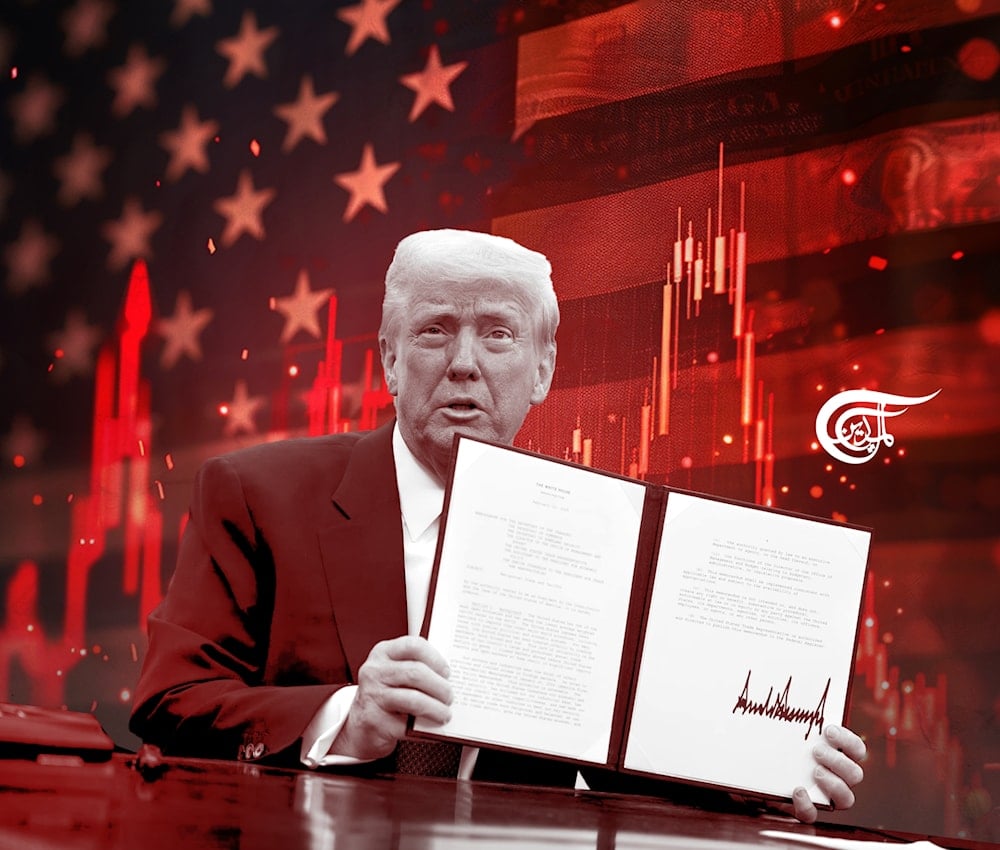Why Trump’s tariff playbook will come back to bite
Trump's tariff policies risk economic backlash, global retaliation, and harm to U.S. interests.
-

The real pain could seep in once Washington reckons with the wide arsenal of targeted measures at EU’s disposal (Illustrated by Mahdi Rteil to Al Mayadeen English)
US President Donald Trump thinks the United States has indefinite “leverage” against key nations, and communicates that sense through highly politicized tariffs.
As the penalties are imposed on China, Canada, and Mexico, the EU is also on the radar. However, the reality is much different: these drastic economic measures will prepare the ground for retaliatory steps that will cause more damage to the US economy than this administration cares to admit.
Begin with China. It is the second largest economy in the world, and increasing tariffs by 10 percent puts a significant strain on Washington’s own domestic audience. The tariffs have fuelled speculation that Trump could complicate domestic efforts to address inflation. Moreover, Trump’s America will not be immune to China’s prospective countermeasures, which could hit US coal, crude oil, and liquified natural gas (LNG) commodities.
Washington is also looking at a further loss of international credibility at the World Trade Organization (WTO). Look no further than China’s complaint at the trade body over US efforts to discriminate against products from a single national origin – China. The US, which has made an effort to sidestep trade rules and regulations to escalate its trade policy, should deal with the same mechanisms that it is keen to undermine.
Targeting the European Union (EU) is also detrimental to US interests. Washington is looking at the prospect of its service sector getting dragged into a broad trade war, because Brussels has Silicon Valley giants in its sight. Targeting US ‘big tech’ means more than just retaliation: it could ensure that the lifeblood of US technological innovation is not immune to the trade war, inviting friction between the hawkish Trump administration and America’s corporate elite. While the Trump administration touts these tariff threats as an attempt to protect US interests, EU attacks on US technology giants would confirm that their interests are all but protected.
The real pain could seep in once Washington reckons with the wide arsenal of targeted measures at EU’s disposal. For instance, the EU’s anti-coercion instrument – better known as ACI – could put a full stop on foreign direct investment, and allow the bloc to bar market access for select service sectors. The irony of this misguided tariff war game is impossible to miss: part of Trump’s levies are meant to ward off EU action against US technology companies, but they could end up fueling even stricter EU action. By leaving out the protection of intellectual property rights to tightening the noose around big tech’s commercial aspirations, an executed trade war with the EU could put the Trump administration’s simmering romance with Silicon giants on thin ice. “All options are on the table,” said one informed European official to the Financial Times recently. He also made clear that the ACI was the EU’s most stringent possible retaliatory measure within the scope of international law.
So let’s ask ourselves – does all this carry the echoes of an “America First” success story? One that uses tariffs for global dominance and entails zero side effects? Barely.

 Hannan Hussain
Hannan Hussain
 3 Min Read
3 Min Read











